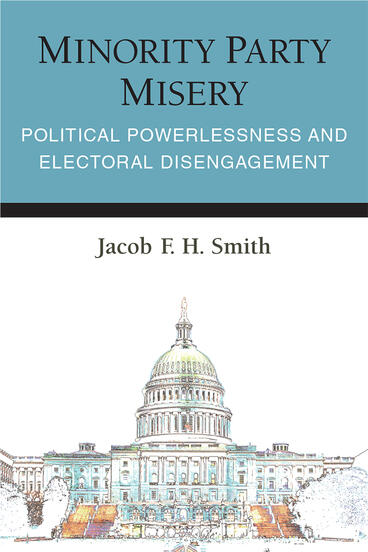Minority Party Misery
Political Powerlessness and Electoral Disengagement
When lawmakers take their ball and go home
Description
This book examines the role of minority party status on politicians’ engagement in electoral politics. Jacob Smith argues that politicians are more likely to be engaged in electoral politics when they expect their party to be in the majority in Congress after the next election and less likely when they anticipate their party will be in the minority. This effect is particularly likely to hold true in recent decades where parties disagree on a substantial number of issues. Politicians whose party will be in the majority have a clear incentive to engage in electoral politics because their preferred policies have a credible chance of passing if they are in the majority. In contrast, it is generally difficult for minority party lawmakers to get a hearing on—much less advance—their preferred policies, particularly when institutional rules inside Congress favor the majority party. Instead, minority party lawmakers spend most of their time fighting losing battles against policy proposals from the majority party. Minority Party Misery examines the consequences of the powerlessness that politicians feel from continually losing battles to the majority party in Congress. Its findings have important consequences for democratic governance, as highly qualified minority party politicians may choose to leave office due to their dismal circumstances rather than continue to serve until their party eventually reenters the majority.
Jacob F.H. Smithis Assistant Research Professor of Statistical Science at Duke University, where he also previously held the position of Lecturing Fellow in the Thompson Writing Program
Reviews
“Minority Party Misery will advance research on congressional elections—especially retirement, recruitment, candidate emergence, candidate quality, etc.—as well as fill in gaps in the political science literature on Members’ motives in choosing whether to run for re-election. Smith pulls together a remarkable amount of existing research in building his theory . . .this book fills gaps.”
- Bill Connelly
—Bill Connelly, Washington and Lee University
“Lawmakers find it painful and frustrating to serve in the minority party. This splendid book explains how their misery shapes their electoral decisions. With rigorous research and shrewd practical insight, Jacob Smith makes a significant contribution to our understanding of legislative behavior and political parties.”
- John J. Pitney, Jr.
—John J. Pitney, Jr., Claremont McKenna College
“Minority Party Misery offers an original and compelling theory linking the projected success of politicians’ parties to members’ participation in electoral politics. Smith brings a wealth of data to his analysis of the conditions in which legislators are more likely to retire from office, fundraise on behalf of the party, as well as the likelihood of quality candidates to emerge. Importantly, Smith finds considerable differences in how minority party status influences the electoral calculations of members at the national and state level, a subject that has received scant attention. This provides a more nuanced examination of exactly how institutional differences shape members’ electoral calculations. This work has important implications for the quality of American elections and democratic representation more broadly.”
- Jennifer Hayes-Clark
—Jennifer Hayes Clark, University of Houston
“In this superb book, Jacob Smith shows how anticipation of serving in the minority party diminishes electoral engagement among party politicians—for example, by dampening ambition for a seat in Congress and depressing member fundraising for the party. Smith tells an important story about the implications of minority party disempowerment for democracy. It’s a must-read for students of legislative parties and elections.”
- Bruce Larson
—Bruce Larson, Gettysburg College
"Smith (Duke Univ.) makes a critical contribution to understanding congressional and state legislative behavior by studying an often overlooked part of legislative studies: the minority party. ... This publication is essential for scholars at all levels interested in Congress, state legislatures, and legislative elections."
- CHOICE
—CHOICE
"...Minority Party Misery is an important contribution to the study of elite electoral behavior, and it should be read by all who are interested in the topic."
- Congress & The Presidency
—Congress & The Presidency
Supplemental Materials
Please see our Fulcrum platform for additional resources related to this title.

